Discovering the joys and benefits of raising backyard chickens.
Is it just a coincidence that the word chicken begins with chic, as in cool, fashionable, and popular? Based on recent trends, we think not.
While it’s difficult to accurately determine how many households include backyard chickens, a 2018 American Pet Products Association survey estimated roughly 10 million American households raise their own chickens. And that was before the pandemic, which APPA reports has substantially increased the number of backyard coopers.
Lest you think that these are all backwoods, rural sorts, think again. A National Institutes of Health study of the 150 most populous United States cities revealed that a whopping 93 percent of them permit poultry raising in some capacity. In fact, suburban and urban dwellers of all ages, genders, and economic levels have been going clucking crazy for chickens.
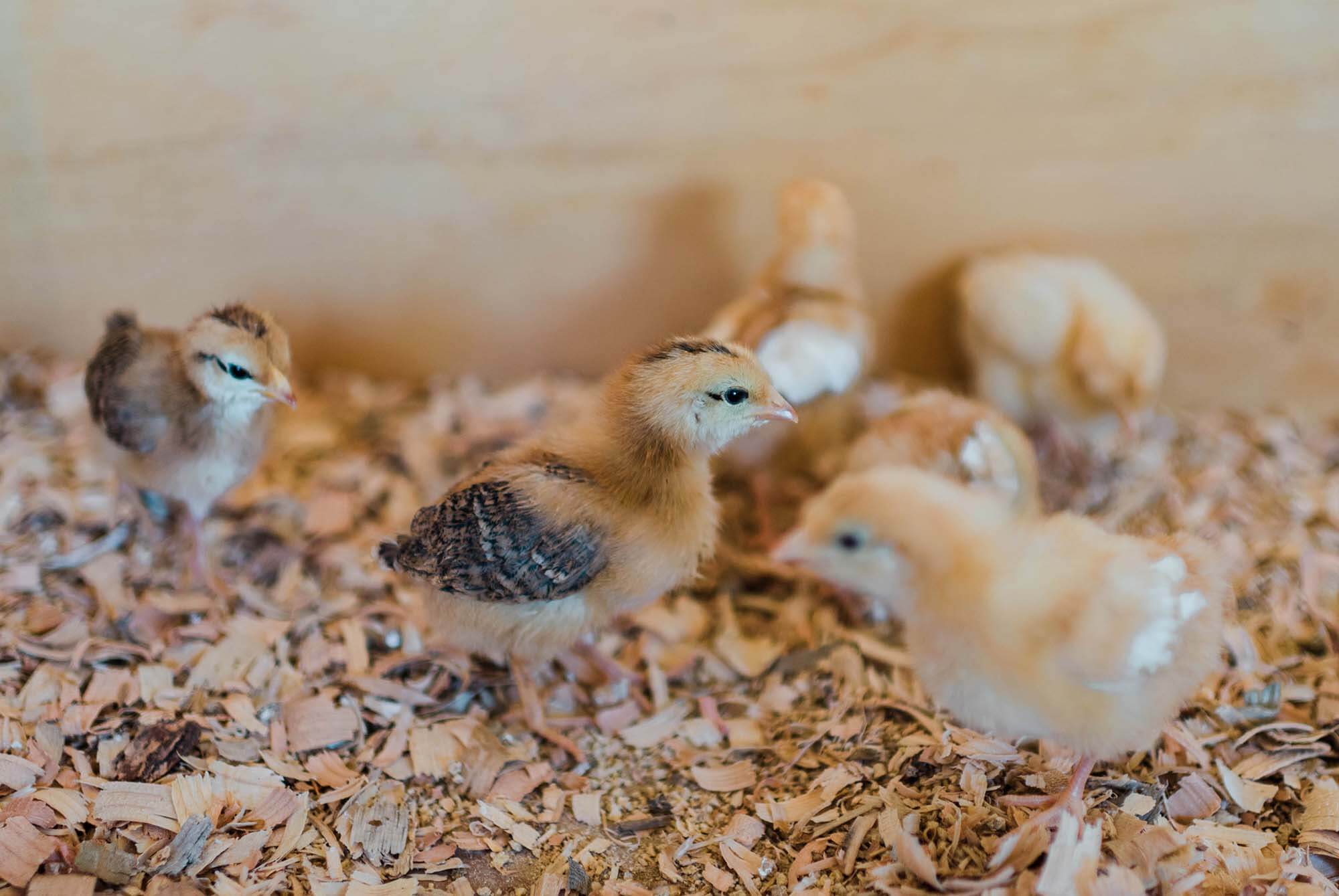
And as for the chic factor — Martha Stewart, Oprah Winfrey, Julia Roberts, Kevin Bacon, Jennifer Garner, and royal couple Prince Harry and Princess Meghan are just a few of a growing chorus of celebrities that sing the praises of raising their own hens. The reasons they cite are varied and echoed by millions of other backyard chicken lovers.
Wise Whys
The No. 1 reason to raise chickens? Eggs! These beauties, with their golden-orange yolks, are better tasting than their factory-raised counterparts. They’re also healthier! Research has shown that responsibly raised backyard hens produce eggs with substantially more vitamins E and D, beta-carotene, antioxidants, and those healthy long-chain omega-3 fats, while containing less saturated fat and cholesterol than eggs from caged hens. (Read more about the benefits of local eggs in our feature story.)
Concerns over food security and self-sufficiency were magnified by supply-chain shortages and empty grocery shelves during and following the pandemic. Having the convenience of a ready supply of high-quality protein just outside your back door is an attractive incentive for many.
Social consciousness also ranks highly among people who are repelled by the inhumane living conditions and treatment of factory-farmed hens.
Environmental concerns also are important. Producing your own food cuts down on your ecological and carbon footprint. Additionally, chickens provide chemical-free, environmentally friendly bug control, happily devouring any insect they find. Plus, since chickens love to eat your unwanted food scraps, they minimize waste and turn it into nutrient-rich fertilizer for your garden. That’s right: Chicken poop, once composted, is about the best fertilizer around.
By the way, if you don’t compost or can’t use the fertilizer, Greg Haines, who has raised chickens in Reno for more than a decade, has a nifty solution. He has an arrangement with members of the local Sierra Club, who come pick up the bagged bark shavings and chicken droppings he cleans out from his coop. They’re grateful to add it to their compost piles.
Finally, not to be overlooked or understated, is the joy of the adventure. Many people cite the emotionally uplifting experience that tending a flock of chickens provides the caretaker.
Catcher in the Coop
As a former major league baseball catcher, with a decade-long résumé that includes playing for seven professional teams, Chris Gimenez can legitimately qualify as a local celebrity. Now retired from the big leagues, Gimenez is a host on Sirius XM’s radio show Loud Outs.
The longtime Reno resident is enjoying his newfound freedom, spending time with his wife, Kellie, and their three school-aged children … and, he adds with a wide grin, his beloved chickens. In fact, he says his primary job now is being a stay-at-home chicken dad.
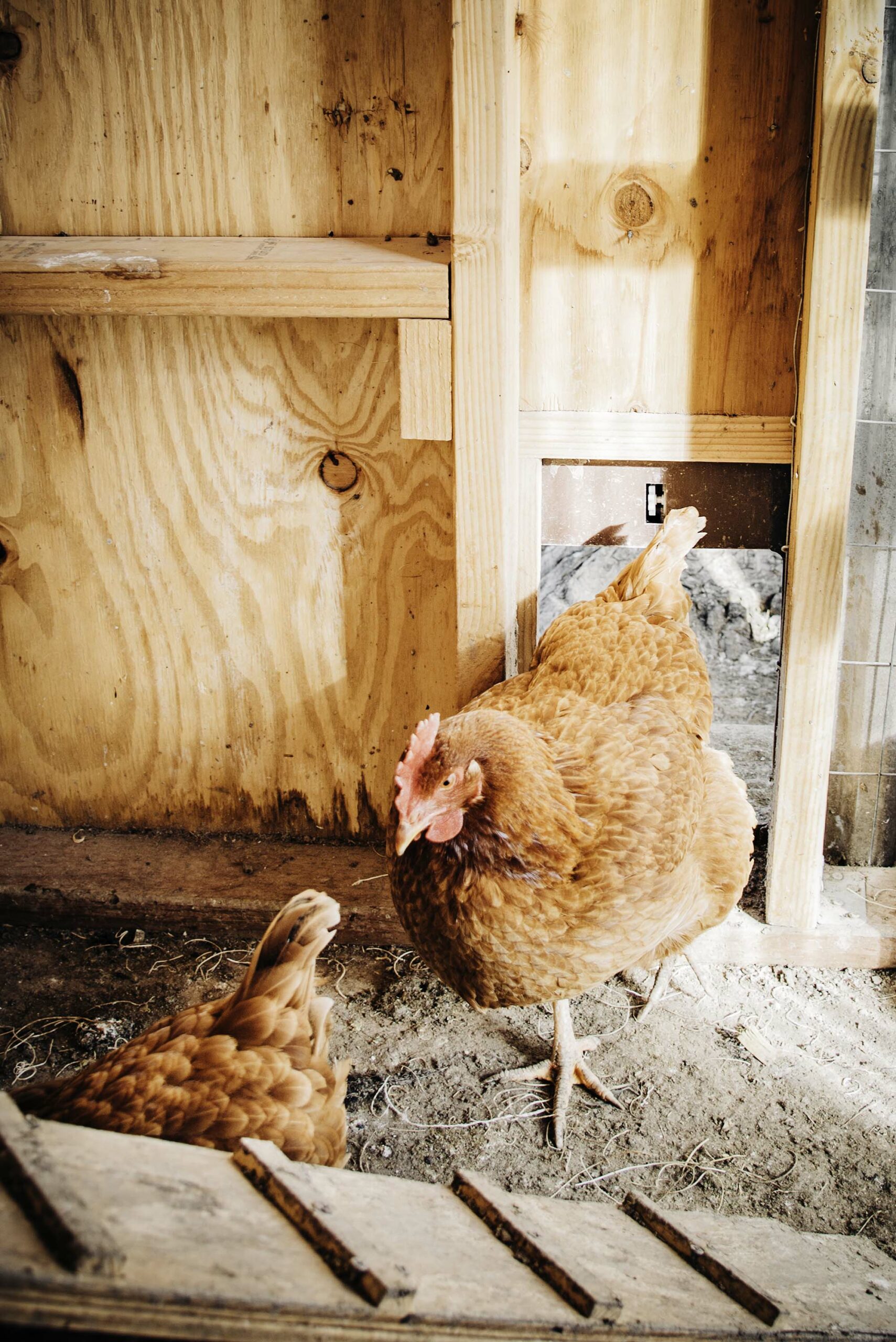
The family started with just two chickens, simply because they thought it would be fun and they’d get a few eggs in the process, and it would be a great family activity. They now have 12 chickens and admit to being absolute, unabashed chicken lovers.
“I never anticipated that they’d become such a part of our family,” Gimenez says. “One of the coolest things is getting to see their unique personalities and having fun with it. I get the biggest kick out of them!”
Chris and Kellie have a trove of tales they happily share, proving the whimsy of life with chickens, such as when their daughter, Joelle, just three years old at the time, decided to carry her favorite chicken to the far side of their huge yard to jump together on the trampoline. The hen was promptly rescued by Mom and a good lesson was learned by all. (Chickens aren’t fond of jumping. Now we know.)

But the Gimenezes point out that rearing backyard chickens actually teaches children so many valuable lessons — about teamwork, responsibility, compassion, environmental consciousness, where their food comes from, and the cycle of life, among others. And, they add, chickens really do make great family pets.
Eggs-actly Where to Begin
Thinking about starting a backyard flock of your own? Here’s a step-by-step process to get you on your way. Let’s begin with the Big Three:
- Education is power. Start by doing research, so you know what you’re getting into. There’s a lot of information available online. If you have friends who have chickens, talk with them about the pros and cons. If possible, spend some time with their chickens, too.
- Chickens make great and easy pets, but they still require daily care — food, shelter, protection, maintenance, and so on. Do you have the time and means to make that commitment? Do you have someone to fill in if you need to take off for a day or more?
- Check your local regulations to determine whether you actually can have a backyard flock in your area. Most local cities, including Reno, Sparks, Carson City, and Truckee, and the unincorporated county areas surrounding them, allow chickens with certain limitations. The number of hens allowed and whether roosters are permitted vary, so check local codes for specifics. The one regulatory constant, particularly in cities, seems to be that it’s OK as long as there are no complaints. So it’s a good idea to check with your neighbors before you make this decision.
One last caveat: If you live in a community with a homeowners association, be aware that HOA regulations override all city/county ordinances. Check those first.
Creating a Backyard Flock
If you’ve gone through the Big Three and all systems are still go, let’s get down to the particulars of actually making your backyard flock a reality. For expert guidance, we consulted with Natalie Andelin, co-owner of Andelin Family Farm in Spanish Springs, where she oversees her flock of 60 chickens and runs a small, local egg-distribution business.
For starters, you’ll need chickens, of course. It’s smart to decide on the number you want, as this will determine coop size and space requirements. Andelin recommends starting with four to six chickens. At peak production, each will lay an average of four to five eggs a week. As a general guideline, four chickens will give you 16 to 20 eggs a week, which is a good amount for an average family.

Chicks of popular chicken breeds well-suited for this area generally are available locally (see sidebar for suggestions). Cost runs about $4 to $7 each for most breeds. A word of caution: Chicks are vulnerable and require specialized care and equipment for about the first six weeks of life, until their adult feathers come in.
The equipment needed for a successful start includes a brooder box, bark shavings, water and food dishes, heat lamp and bulb, and an ample supply of chick starter food. These are widely available locally or online and must be purchased before or along with the chicks.
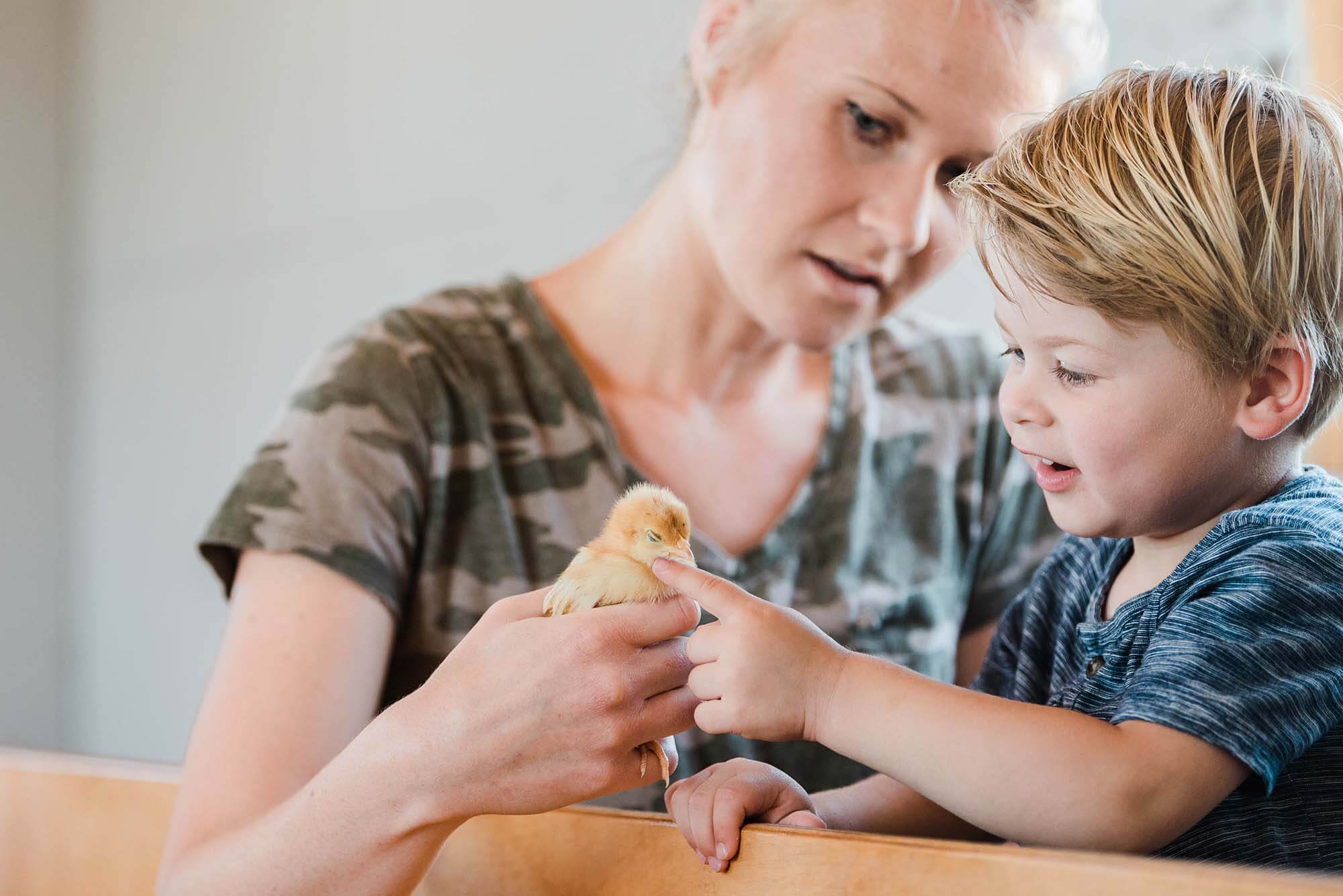
For convenience, Andelin says her farm sells Chick Starter Kits, which include four or six chicks each (can be of two varieties) and all the equipment mentioned above. She also includes an instruction sheet on raising them for the first few months.
Andelin also sells fertilized eggs that can be incubated and hatched by the purchaser. The downside of this, she says, is that you won’t know how many unwanted roosters you might get in the batch, whereas buying chicks that have already been sexed by the hatchery ensures greater probability of getting hens.
For that reason, the sale of hatching eggs is pretty much limited to schools, where it is a learning opportunity for students. Andelin accepts the return of any of the hatched chicks that have not been re-homed by the school. The Gimenez family actually adopted seven birds, five hens and two roosters, from the hatching project at the children’s school.
Now, if you’re ready to buy chicks, we can move on to the next concerns: Which kind should you get? For beginners, Andelin suggests choosing from this list of her favorites: barred rocks, Rhode Island reds, amberlinks, cinnamon queens, Ameraucanas, and Easter eggers. They all have calm, docile temperaments; are hardy, good layers; tolerate cold and hot weather well; and are easy to care for.
The Coop
By the time the birds are ready to leave the brooder, you’ll need a place for them to live. Generally, this will be your greatest expense.
A henhouse can be a simple, small structure or an elaborate one. (Celebrity Nicole Richie’s was featured in Architectural Digest!) If you prefer the easy alternative, henhouses can be purchased from many sources, either through local feed stores or online. Prices for a small, basic coop that can house four chickens generally start around $200 and go up to four figures.
If you’re handy, you can build one yourself, which cuts down on cost. Some clever people have even converted their children’s old playhouses into henhouses. There are all sorts of plans and ideas available online.
A coop must include at least one nesting box for every four to five chickens. This is where they will lay their eggs. The addition of an exterior door to the nesting box makes egg collection easier.
Chickens prefer sleeping high off the ground, so roosts are another must. A round, wooden bar, positioned high in the coop, is ideal. Since the birds spend a lot of time up there, it’s smart to place a dropping board, pan, or box below the roosting bar to collect the manure, making regular cleanups easier.
Other supplies needed are water and food dispensers. Ongoing needs include bark shavings to line the nesting boxes.
The Run
To keep your chickens healthy and happy, they need fresh air and sunshine as well as a place to exhibit normal chicken behaviors such as scratching, foraging, dust-bathing, and preening. Free-ranging your hens would be optimal, if possible.
However, because we live in an area with lots of predators, your chickens also will need a run, which is an outdoor, protected space in which to roam. Even in urban housing developments, coyotes, bears, hawks, raccoons, bobcats, owls, mountain lions, and the like can show up at your henhouse doorstep — and they won’t leave empty-handed. Three people we spoke with had previously lost their entire flocks, two to raccoons and one to a bear.
The best way to avoid this situation is to enclose your henhouse area with sturdy fencing, including installing chicken wire or hardware cloth along the top to prevent your hens from flying out and predatory birds from flying in.
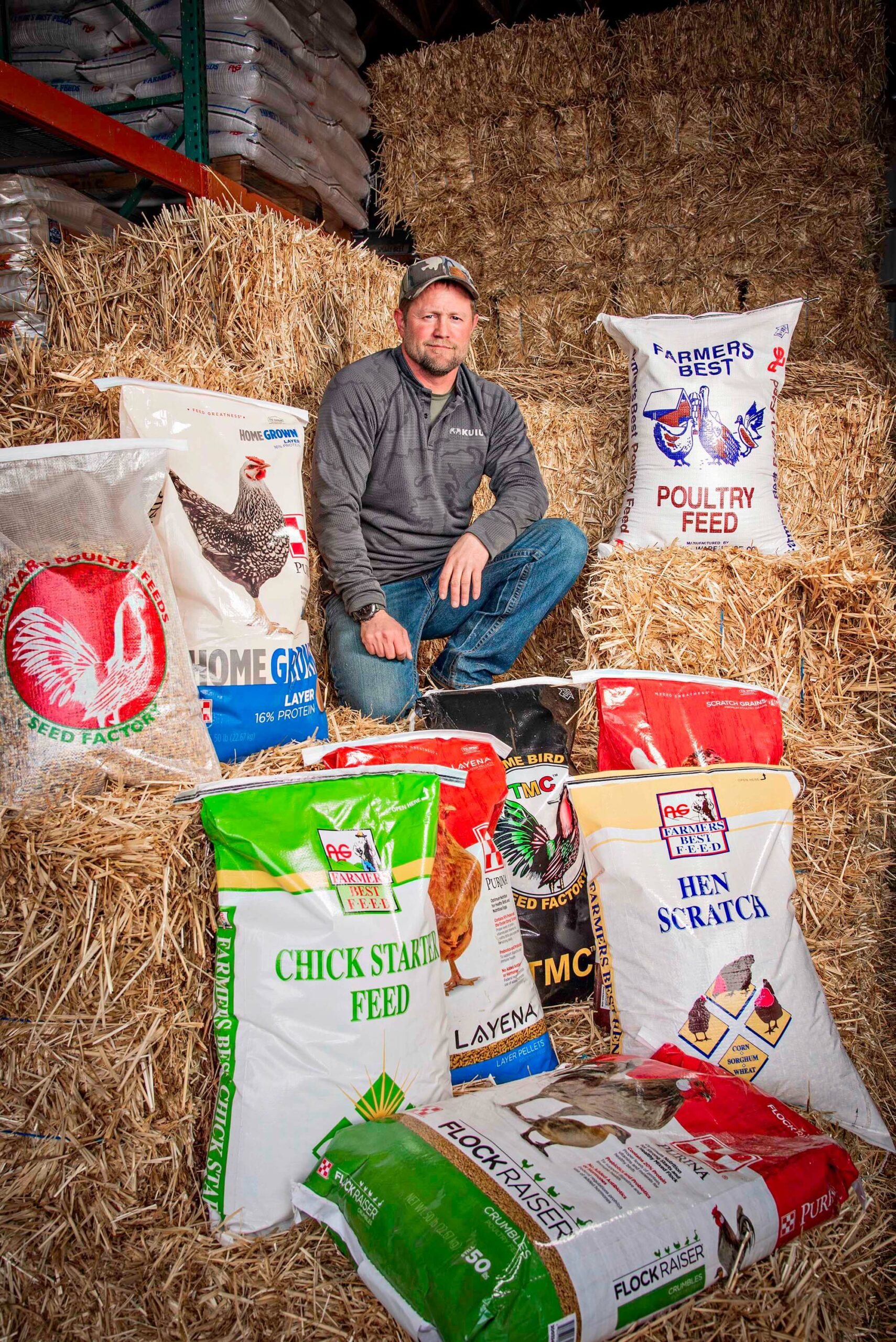
The Grub
For your chickens to produce good-quality eggs, 90 percent of their nutrition should come from commercial food scientifically formulated for layers. They also will enjoy occasional treats such as mealworms.
Chickens are omnivores, so their diets benefit from supplementation with a variety of kitchen and garden scraps, especially vegetable and fruit peels — lettuce and melons are particular favorites. If you let them forage in your yard, they also will enjoy gobbling any bugs they find and control weeds with their scratching, pecking, and eating of seeds. All this makes for less food waste, fewer weeds, and natural bug control. And in turn, they reward you with healthier eggs and great garden fertilizer — it’s a win-win for all.
The Eggs
Let’s turn to the peak reward you’ll reap for your efforts: the eggs you get to collect. But not so fast. Your new chickens won’t start laying eggs until 16 to 24 weeks of age. (And no, you do not need a rooster to make this to happen.) The day each hen lays her first egg, trust us, you’ll know — she’ll announce it with great pride. Suddenly, your coop will be overflowing with fabulous eggs.
Full disclosure: Your girls will take a well-deserved break in the winter. Egg production will slow down, or even stop for some breeds, during the darker months. You can mitigate this a bit by providing extended light with the addition of a simple bulb, on a timer, inside the coop. But the general recommendation is to allow them to follow the normal and natural cycle and let them have their rest.
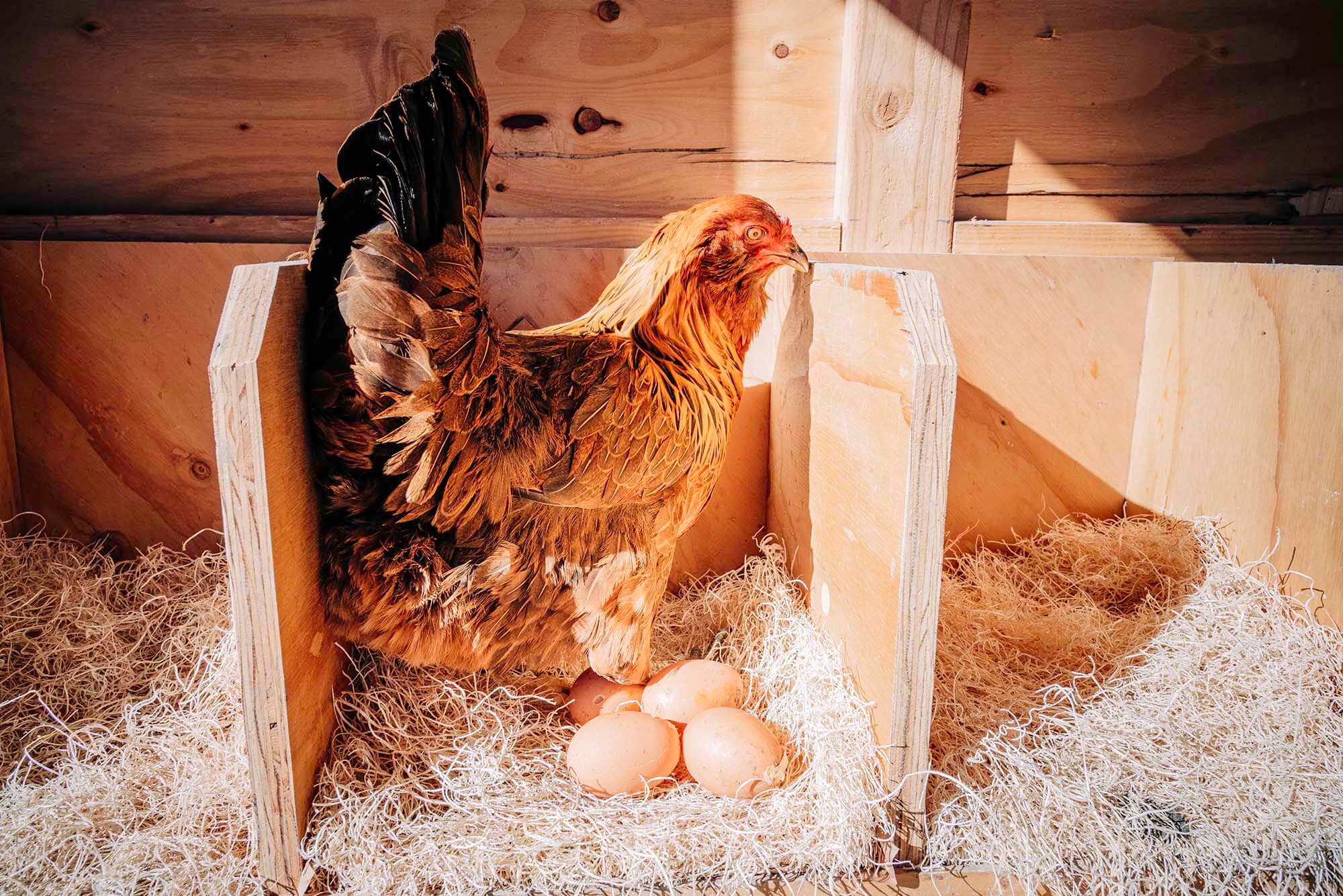
But during spring and summer, you have all those delicious, nutritious eggs, which brings up a common question: Do you wash them or not? This is the subject of some controversy. A freshly laid egg is coated with a natural biofilm called bloom, which prevents bacteria from penetrating the shell and keeps it fresh for many weeks, even on your kitchen counter. In fact, in most other countries, that’s how eggs are kept, at room temperature.
Once eggs are washed, the protective bloom is gone, and they must be refrigerated. So why bother to wash them, as we do here? The simple answer is salmonella, a common bacterial disease that affects the intestinal tract.
Chickens can harbor salmonella, which may be transferred to the eggshells, particularly if excrement comes in contact with the shell. Many people who raise backyard chickens choose not to wash them, as long as the egg appears to be clean, opting to let nature’s natural protection remain in place. Many others prefer to err on the side of caution and wash, then refrigerate, their eggs.
While commercial eggs sold in the U.S. must be washed and refrigerated, as a backyard chicken keeper, you have the choice to do either. There are valid arguments for each option, and the debate rages on. We suggest you do your own research to make the decision that best meets your needs.
Certainly, concerns about salmonella shouldn’t be taken lightly. That said, most chicken owners have experienced few if any issues with it. By simply instituting a few cautionary practices, much of the problem can be avoided.
Keeping the nesting box fresh and free of excrement is the best way to ensure clean eggs. Always wash your hands with soap and warm running water after handling your chickens, doing coop maintenance, and collecting eggs. It’s also a smart idea to keep an outdoor pair of shoes or boots for stomping around the chicken run.
In closing, we defer to someone who can put it all into perspective.
“Remember, this is a whole endeavor,” Andelin says. “You have to account for the ebb and flow. It’s more about the quality and freshness of the egg, the experience of having a sustainable food source in your backyard. It’s probably a little cheaper and easier to get your eggs from the store. But, hey, I wouldn’t trade this experience for anything!”
Reno writer Barbara Twitchell has thought about getting a few chickens for a long time. Researching this story was fun, interesting, and just might be the impetus she needs to finally bring home some baby chicks.
RESOURCES
The following local resources sell chicks as well as a variety of supplies and equipment needed to raise and maintain chickens. Many also sell coops, either through online vendors or in store. It is advisable to call ahead to confirm availability and varieties of chicks and coops.
Andelin Family Farm
8100 Pyramid Way, Spanish Springs • Andelinfamilyfarm.com
For Chick Starter Kits or Hatching kits, email Andelinfamilyfarm@gmail.com
Benson’s Feed & Tack
2750 Hwy. 50 E., Carson City
775-882-3999 • Bensonsfeed.com
Big R
Bigrwest.com
Sparks: 775-825-2447
Fernley: 775-575-2447
Fallon: 775-423-8555
CAL Ranch
Calranch.com
Reno: 775-525-3737
Carson City: 775-461-2213
Eastern Sierra Feed
1245 Waterloo Lane, Gardnerville
775-782-3143 • Easternsierrafeed.com
Green’s Feed
75 Bailey Drive, Ste. 7825, Reno
775-323-1502 • Find Green’s Feed Inc on Facebook
Rancher’s Feed & Supply
60 E. Surge St., Reno
775-972-7200 • Find Ranchers feed & supply on Facebook
Sierra Feed & Saddlery
7460 S. Virginia St., Reno
775-853-6700 • Find Sierra Feed on Facebook
Tractor Supply Co.
Tractorsupply.com
Carson City: 775-841-6421
Minden: 775-783-8675
Sparks: 775-356-3595


